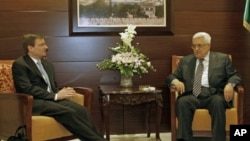United States' envoys are visiting Israel and the Palestinian territories ahead of a meeting of the United Nations General Assembly where a Palestinian statehood bid will be discussed.
Two senior American officials are holding separate talks with Israeli and Palestinian leaders this week in Jerusalem and the West Bank. White House official Dennis Ross and Middle East envoy David Hale hope to avert a Palestinian plan to seek recognition in two weeks of a Palestinian state at the United Nations.
Both the United States and Israel oppose the plan, saying unilateral steps are counterproductive, and the only way to achieve Palestinian statehood is through negotiations.
Israeli Prime Minister Benjamin Netanyahu made a direct appeal to Palestinian leader Mahmoud Abbas.
"I call on President Abbas to resume peace negotiations, direct negotiations, right now, without any preconditions," he said.
Abbas has refused to return to the negotiating table until Israel stops settlement expansion in the occupied West Bank and East Jerusalem, but Israel has refused. Abbas said he supports a negotiated peace, but the policies of Israel's government forced the Palestinians to go directly to the U.N.
"We decided because there are no negotiations. Our priority, first priority, second priority, third priority is negotiations," said Abbas.
To become a full U.N. member, the Palestinians would need approval from the Security Council, where the U.S. has threatened to use its veto. So the Palestinians could turn to the General Assembly for a symbolic vote, which most analysts say probably would be approved.
Meanwhile, the Palestinian Authority has called for mass demonstrations in the West Bank to coincide with the U.N. meeting. While the Palestinians say the demonstrations will be peaceful, Israeli officials have warned that protests could spin out of control and spark a new round of violence.
US Seeks to Forestall Palestinian Statehood Effort at UN




